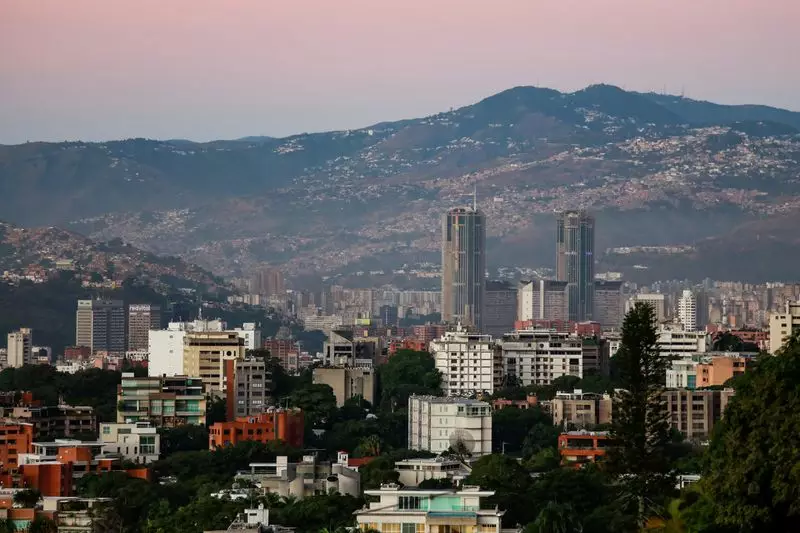In a striking show of international tension, the United States recently imposed sanctions on eight officials from Venezuela, coinciding with President Nicolás Maduro’s inauguration for a controversial third term. This move, amplifying the reward for Maduro’s arrest to $25 million, is a clear indication of the faltering political landscape following the disputed presidential election. The context of this action is critical; both Maduro’s Socialist party and the opposition claim victory from a vote which is widely viewed as being marred by irregularities and oppression. This standoff reflects a deep polarization within Venezuelan society and has far-reaching implications for both domestic stability and external diplomatic relations.
The newly sanctioned officials include high-profile figures such as Hector Obregon, the recent head of the state oil company PDVSA, and Ramon Velasquez, the transportation minister. These sanctions were part of a broader strategy, aligning with similar punitive measures from the United Kingdom and the European Union targeting 15 Venezuelan officials. Canada also joined the fray, imposing its own set of sanctions, thereby collectively demonstrating international disapproval of Maduro’s regime.
A Tough Stance from the U.S. Government
U.S. officials have expressed a steadfast stance against Maduro’s government, characterizing it as repressive and illegitimate. Bradley Smith, the Acting Under Secretary of the Treasury, emphasized the United States’ alignment with Venezuelan citizens who desire a leadership change amidst a backdrop of escalating governance issues. The Biden administration’s approach reflects a continuity of a hardline policy to support democracy in Venezuela, even as it transitions to a new presidential administration.
Maduro’s response, however, has been defiant. In his inauguration speech, he dismissed U.S. sanctions as mere “economic warfare,” accusing the U.S. of attempting to undermine Venezuelan sovereignty. The rhetoric from Maduro’s camp has consistently framed these actions as a form of retaliation, portraying the Santiago government as a stalwart resisting external aggression despite its ongoing economic crisis.
Claims of Election Legitimacy and Opposition Dynamics
The disarray within Venezuela’s political system is underscored by conflicting narratives about the recent elections. While the national electoral authority declared Maduro the victor, the absence of detailed electoral data has led various opposition figures, including Edmundo Gonzalez, to assert that they rightfully won. This has sparked an outcry from the international community, which widely regards the electoral process as compromised.
Moreover, the implications of these contested results have considerable consequences for the opposition, which has been facing steep challenges. Prominent leaders have been imprisoned or intimidated, and Gonzalez’s potential arrest upon his return from exile exemplifies the current political landscape’s volatility. This pushing and pulling between competing factions reflects a desperate tug-of-war for political legitimacy in a context where the government appears unyielding.
Despite the array of sanctions and mounting pressure from past U.S. administrations, Nicolás Maduro has managed to maintain his grip on power since 2013 with notable support from the military and strategic alliances with countries like China, Russia, and Iran. The upcoming Biden-Trump transition may complicate further U.S. engagement strategies, particularly regarding Venezuela’s oil, which has historically been a focal point of sanctions.
Maduro’s tenure has been marked not only by international sanctions but also substantial internal strife. The crumbling economy, soaring inflation, and widespread shortages pose significant challenges to citizens and the legitimacy of his government. Nevertheless, his assertion of enduring resilience amid adversity resonates with certain sectors of the populace who view his government as a bulwark against foreign intervention.
As the Biden administration prepares to make way for the Trump administration, uncertainty looms over future U.S. policy towards Venezuela. Trump’s previous term was characterized by a “maximum pressure” campaign targeting Maduro’s regime, with severe restrictions on the oil industry, which the President has claimed is not crucial for U.S. energy needs. However, immigration remains a contentious issue that could complicate relations, as many individuals fleeing Venezuela seek refuge in the U.S.
The outcome of this political chess game remains uncertain, with the potential for diplomatic engagements or further confrontations in the future. The Venezuelan population continues to suffer the consequences of political instability, with the international community watching closely as the situation evolves. Ultimately, the resolve of both Venezuelan officials and their U.S. counterparts will shape the next chapter in this ongoing saga.

